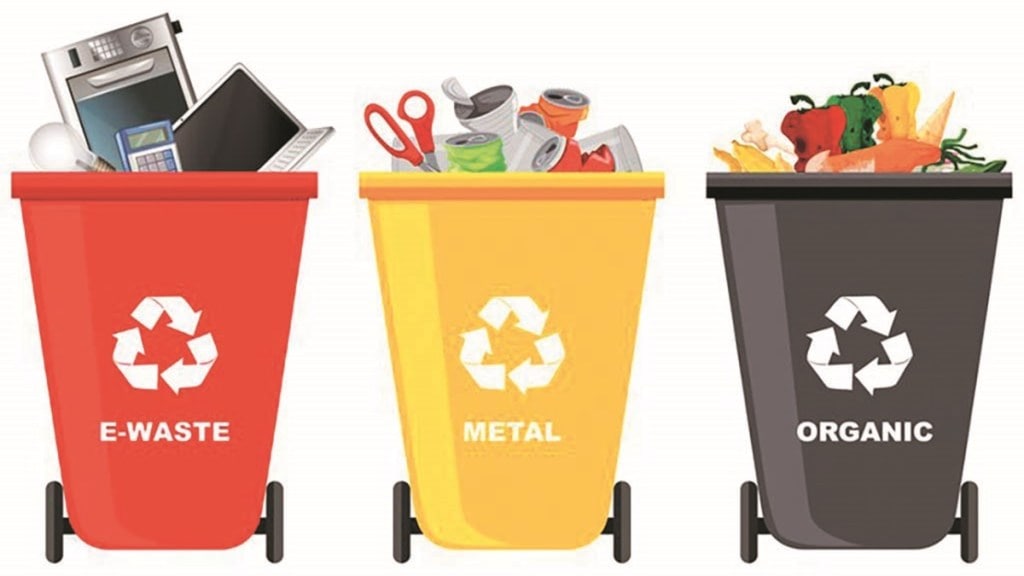By Radhika Kalia
E-waste, encompassing discarded electronic items like smartphones, laptops, and appliances, has emerged as a major concern in this day and age. In 2019, global e-waste generation reached nearly 53.6 million metric tons and is projected to touch 74 million by 2030. E-waste poses substantial environmental and health risks, with the potential to contaminate soil and water, cause air pollution, and releasing greenhouse gases. India ranks third globally in e-waste generation, after China and the USA, due to rapidly increasing digitalization and reliance on electronics. Annually, the country sells over 17 million TVs, 148 million smartphones, 14 million refrigerators, 19 million audio devices, and 6.5 million washing machines. E-waste generation escalated from 700,000 tonnes in 2017-18 to 1.6 million tonnes by 2021-22. The trend is expected to continue, projecting nearly 14 million tonnes of e-waste by 2030.
Dimensions of E-waste Management
In light of the dire consequences threatened by e-waste generation, e-waste management has assumed much importance. Effective e-waste management involves several key dimensions, these include:
Collection and Transportation: Establishing strategic collection points and partnering with logistics firms for safe e-waste transportation.
Sorting and Segregation: Differentiating hazardous from non-hazardous materials for safer recycling processes.
Innovation and Technology: Promoting the creation of durable, repairable electronics and emphasizing circular economy practices like reuse and recycling.
Recycling and Disposal: Setting up efficient recycling facilities and collaborating with specialized companies for responsible e-waste management.
Policy and Regulation: Enforcing e-waste management policies, including legal frameworks, penalties for non-compliance, and incentives for eco-friendly practices.
Public Awareness and Education: Informing the public about responsible e-waste management and its impacts, and promoting sustainable behaviors.
Corporate Responsibility: Encouraging companies to adopt green policies, support recycling initiatives, and reduce waste.
Environmental and Social Impacts: Addressing the environmental and health risks of e-waste, advocating responsible disposal, and aiding affected communities.
These dimensions are important to secure a safer, greener, and healthier future, ensuring responsible and sustainable e-waste management.
Increased Scope of Regulations
The Indian government has been sensitive to the challenges of e-waste management. The E-Waste Management Rules 2018 were revised to enhance collection, recycling, and environmentally sound e-waste management. These rules set targets for e-waste collection and recycling, especially for new producers. The new e-waste policy, implemented in April 2023, significantly expanded in scope. It included more items like solar panels, acknowledging the need for responsible disposal as demand for renewable energy sources increased. The policy aimed to reduce hazardous substances in electronic products and included over 100 types of equipment under Extended Producer Responsibility (EPR). While the measures aimed to foster responsible e-waste management, reduce harmful practices, and ensure manufacturers’ compliance in managing the end-of-life stages of their products, it must be borne in mind that policies would continue to evolve with technological and societal changes, requiring ongoing adjustments and improvements.
Challenges Ahead
The importance of effective e-waste management in India is indeed being acknowledged and the Indian government is taking steps to encourage responsible e-waste management, yet there remain significant challenges. These include:
Public Awareness: A primary issue is the lack of public awareness about the environmental impacts of e-waste. Many people unknowingly contribute to the problem by selling discarded electronics to scrap dealers or simply throwing them away, leading to landfill accumulation.
Illegal Dumping: Illegal disposal of e-waste, prevalent especially in developing countries, poses severe environmental risks. This practice is notably rampant in the informal sector.
Inadequate Infrastructure: The lack of specialized infrastructure, including recycling plants, hinders proper e-waste disposal and recycling. Developing such infrastructure necessitates time and collaboration between government and private entities.
Data Availability: Monitoring and evaluating the effectiveness of e-waste management initiatives is impeded by limited data. Decisions for future actions rely on feedback and data analysis, requiring extensive coordination between various stakeholders.
Public Participation: Engaging the general public is challenging, particularly when many expect monetary compensation for their e-waste.
Informal Sector Dominance: Over 90% of e-waste collection is through the informal sector, where recycling practices are often unsafe and environmentally harmful, leading to further pollution and landfill waste.
Addressing these challenges is crucial for the advancement of sustainable e-waste management in India.
Encouraging Patterns
It is encouraging, however, that the ecosystem is developing, thanks to players entering the domain. Several stakeholders have emerged with their recycling and dismantling units. Awareness among people is also increasing, and companies like RLG India Systems Pvt Ltd are actively engaged in raising public awareness on the issue and providing end-to-end solutions in the sector. There has been a visible increase in awareness towards rising volumes of e-waste and the need for responsible disposal of such waste. At the same time, systems have come in place to help users dispose of their waste and spare them unwanted hassle. Having said that, a lot still needs to be done, consistently and continually.
RLG Systems India Pvt Ltd has been relentlessly striving towards creating a structured e-waste management system and fostering a circular economy within the nation. The company places a strong emphasis on raising e-waste awareness, endeavouring to expedite the spread of information and elevate people’s consciousness across the country concerning the criticality of proper e-waste disposal and recycling practices. Through its prominent Clean to Green (C2G) Campaign, spanning from the financial year 2017-18 to 2022-23, the company has made significant strides in outreach. It has connected with communities across 26 states and 7 Union Territories, engaging diverse groups including schools, colleges, residential welfare associations, office complexes, retailers, bulk consumers, and participants from the informal sector. Over this period, RLG Systems India has successfully conducted 8,614 activities throughout the country, managing to reach an impressive total of over 46.48 million individuals.
As we maneuver through the complexities of today’s global landscape and come face to face with contemporary challenges, including those associated with business and the environment, we must pivot towards sustainable solutions that balance growth with environmental preservation. At RLG Systems India, we are redefining e-waste as a resource, and in the process, reshaping the domain. Our vision is to pioneer a paradigm shift towards a circular economy, where every discarded electronic device is seen as a potential resource for the future. Through our extensive e-waste awareness programs, collaborations with leading brands, and innovative initiatives like the Clean to Green campaign, we are raising awareness and actively participating in the transformation of e-waste disposal and recycling practices across the country. Our mission goes beyond e-waste management; it is about creating a sustainable, resource-efficient future where technology and ecology coexist harmoniously.
(The author is Managing Director, RLG Systems India Pvt Ltd.)








